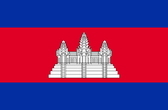
Call 0330 880 3600 Calls may be monitored or recorded. Opening Times.
- TRAVEL INSURANCE
- COVID-19 COVER
- More Options
- Help & Advice
- Existing Customers

Call 0330 880 3600 Calls may be monitored or recorded. Opening Times.

Need help?
UK Customer Services0330 880 3600*
Open Monday to Friday 9:00am to 6pm, Saturday 8:30am to 4pm and closed Sundays.
*Calls are recorded for training and quality purposes.

Official name: Kingdom of Cambodia
Capital city: Phnom Penh
Official language: Khmer, French, English
Population: Around 17 million
Currency: Cambodian riel (KHR), although US dollars are widely used
Time zone: GMT+7
Driving side: Right
Climate: Tropical monsoon climate with a wet season from May to October and a dry season from November to April
Cambodia, located in Southeast Asia, is a country of contrasts - from the bustling streets of Phnom Penh to the tranquil rice fields and the awe-inspiring temples of Angkor Wat. The country has endured a turbulent modern history but remains a fascinating destination known for its rich culture, ancient ruins, and resilient people. Tourism is one of the fastest-growing sectors, with Siem Reap and its UNESCO-listed Angkor Archaeological Park serving as the nation’s biggest draw.
Cambodia shares borders with Thailand, Laos, and Vietnam, with a short southern coastline along the Gulf of Thailand. Much of the landscape is low-lying floodplain, dominated by the Mekong River and the Tonle Sap lake, which dramatically expands during the rainy season. The highest peak is Phnom Aural at 1,810 m, part of the Cardamom Mountains. While fertile and rich in natural resources, Cambodia also faces challenges such as deforestation, soil erosion, and seasonal flooding.
Visitors generally enter Cambodia by air via Phnom Penh or Siem Reap, though land crossings from Thailand and Vietnam are also common. Transport infrastructure is improving, with new highways and domestic flights, though rural travel can still be slow. Accommodation ranges from budget guesthouses to luxury hotels. While most visits are trouble-free, travellers should take care with road safety, avoid isolated areas after dark, and remain alert to petty theft in urban centres and tourist hubs.
Most travellers require a visa, which can be obtained online (e-Visa), on arrival at international airports, or at land border crossings. Tourist visas are usually valid for 30 days, with extensions available in Phnom Penh. A passport valid for at least six months beyond entry is required. The UK and other Western nations have embassies in Phnom Penh, offering consular assistance.
The official currency is the Cambodian riel (KHR), but in practice the US dollar is used for most transactions. ATMs are widely available in cities and tourist areas, dispensing both riel and US dollars. Credit cards are accepted in hotels, restaurants, and larger businesses, but cash is still essential, especially in rural areas.
Medical facilities in Cambodia remain basic compared with international standards, though private clinics in Phnom Penh and Siem Reap offer better care for minor issues. Serious medical cases often require evacuation to Thailand or Singapore. Risks include dengue fever, malaria (in rural areas), and food- and water-borne diseases. Travellers should drink bottled water, take insect precautions, and ensure they are up to date on vaccinations including hepatitis A, typhoid, and tetanus.